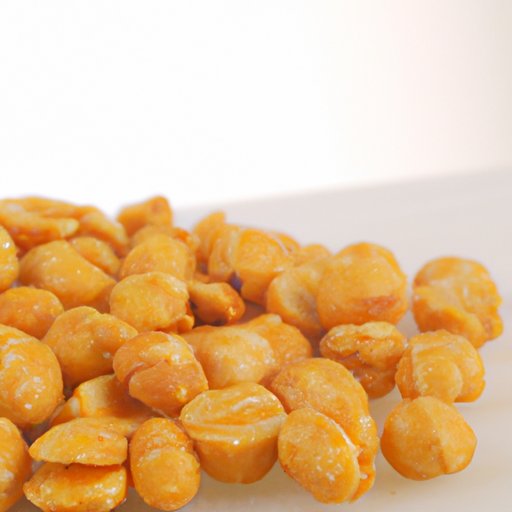Introduction
Corn nuts are a popular snack food made from corn kernels that have been soaked in brine, dried, and fried. They come in a variety of flavors, including barbecue, sour cream and onion, and chili lime. Corn nuts are often marketed as a healthy snack, but is there any truth to this claim? In this article, we’ll explore the nutritional profile of corn nuts and investigate their potential health risks. We’ll also compare them to other snack foods and discuss healthier alternatives.
Exploring the Nutritional Profile of Corn Nuts
Corn nuts are high in calories, with one ounce (about 28 grams) containing 140 calories. However, they are relatively low in fat, with one ounce containing only 3.5 grams of fat and no saturated fat. Corn nuts are also a good source of protein, with one ounce containing 5 grams of protein.
In terms of vitamins and minerals, corn nuts are a good source of vitamin B6, with one ounce providing 12% of the recommended daily value. They are also a good source of magnesium, with one ounce providing 8% of the recommended daily value. Other vitamins and minerals found in corn nuts include iron, zinc, potassium, and phosphorus.
Investigating the Potential Health Risks of Eating Corn Nuts
Although corn nuts are generally considered to be a healthy snack, there are some potential health risks associated with eating them. One of the main concerns is the high sodium content of corn nuts. One ounce of corn nuts contains around 360 milligrams of sodium, which is 15% of the recommended daily value. Eating too much sodium can increase your risk of developing high blood pressure and other cardiovascular diseases.
Another potential health risk is the risk of choking. Corn nuts are hard and can be difficult to chew, so there is a risk that you could choke if you eat them too quickly. If you do choose to eat corn nuts, make sure to chew them thoroughly before swallowing.
Finally, eating too many corn nuts may have an impact on your blood pressure. Corn nuts are high in sodium, and eating too much sodium can lead to high blood pressure. If you have high blood pressure, it is best to limit your intake of corn nuts or avoid them altogether.
Examining the Benefits and Drawbacks of Eating Corn Nuts
Despite the potential health risks associated with eating corn nuts, there are also some benefits. One benefit is that they are a good source of protein and fiber, which can help to keep you feeling full for longer. Corn nuts are also low in fat and contain no trans fats, making them a healthier alternative to many other snack foods.
On the other hand, corn nuts are high in calories and sodium, which can have a negative impact on your health if eaten in excess. Additionally, corn nuts are not a particularly nutrient-dense food, meaning that you would need to eat a lot of them to get the same amount of nutrients as you would from other foods. As such, they should not be relied upon as a primary source of nutrition.

Analyzing the Impact of Eating Corn Nuts on Blood Sugar Levels
When it comes to blood sugar levels, corn nuts are considered to have a low glycemic index. This means that they won’t cause your blood sugar levels to spike, which can be beneficial for people with diabetes or those at risk of developing diabetes. However, it is important to note that corn nuts are still high in calories, so eating too many can still lead to weight gain.
In terms of insulin levels, corn nuts are not known to have any significant effect. This means that you don’t need to worry about them causing your insulin levels to spike.

Comparing Corn Nuts to Other Snack Foods
When compared to potato chips, corn nuts are generally healthier. Potato chips are higher in calories and fat than corn nuts, and they also contain trans fats, which can be bad for your health. Additionally, potato chips are not a good source of protein or fiber like corn nuts are.
When compared to popcorn, corn nuts are not necessarily healthier. Popcorn is lower in calories and fat than corn nuts, and it is also higher in fiber. Additionally, popcorn does not contain any sodium, whereas corn nuts have a high sodium content.

Discussing Alternatives to Eating Corn Nuts
If you’re looking for a healthier snack than corn nuts, there are plenty of options available. Healthy alternatives include nuts and seeds, fruits and vegetables, and whole grain crackers. Unhealthy alternatives include chips, candy, and cookies.
Conclusion
Overall, corn nuts can be part of a healthy diet, but they should not be relied upon as a primary source of nutrition. They are high in calories and sodium, and eating too many can have a negative impact on your health. If you’re looking for a healthier snack, there are plenty of alternatives available. Be sure to read labels and choose snacks that are low in calories, fat, and sodium.
(Note: Is this article not meeting your expectations? Do you have knowledge or insights to share? Unlock new opportunities and expand your reach by joining our authors team. Click Registration to join us and share your expertise with our readers.)
